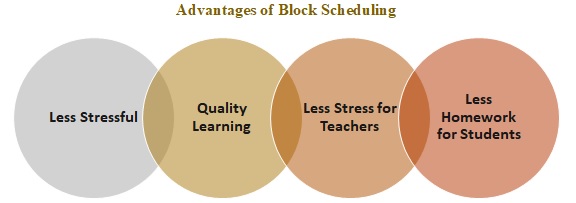Block scheduling is a relatively recent concept that is being acquired by schools and other educational institutes across different countries. In simple words, block scheduling can be defined as a new way of arranging the modules or classes, which is a noticeable deviation from the traditional scheduling system. In a traditional scheduling system, students are expected to attend around 40-50 minutes of class time per subject, every day. Alternatively, within the spectrum of the traditional block scheduling pattern, the students are expected to attend the same four classes every day for 90 days, which essentially makes up for one semester. Universities have been pursuing a traditional block schedule for many years now, and gradually schools are also taking up the concept. On the other hand, there is another system known as the A/B block schedule. Under this pattern, instead of dividing the schedule into semesters, there are specific modules attached to specific days. For example, biology and English can be scheduled for Mondays (Block A), economics and accounts can be for Wednesdays (Block B), and so on and so forth. Courses in education management largely cover the concept of block scheduling, and this emerging concept has multiple advantages that will be considered in this blog.

- Less Stressful: Imagine having to learn biology, economics, English literature, geometry, and history all at the same time on the same day, prepare for all the modules’ exam at the same time, and then attend a bunch of exams sequenced one after the other. Sounds stressful right? If we as adults cannot do this, then why expect the younger students to do so? Contrarily, if the students get to focus on a few modules for a set number of days, their load will be reduced, and less stressed learners tend to be more motivated to learn.
- Quality Learning: When the students get the scope to focus their attention on a few modules and spend their time only with those modules, then they are more likely to participate in quality learning because they do not have to seek balance between a slew of modules and topics, and can instead extensively learn the few modules. As it happens, the teachers can also focus on the modules, explore them more deeply, teach more effectively, and follow a more thorough syllabus that will accommodate better knowledge promotion.
- Less Stress for Teachers: If you are a teacher, teaching different sections and subjects, then you are prone to handling a spate of doubts and questions from students from different sections and modules. However, under block scheduling, when a few fixed modules are being taught, the entire burden of handling too many students are reduced, and the teacher can concentrate on teaching their assigned module with greater attention.
- Less Homework for Students: When studying fewer modules, the burden on the students is less as they do not return home with a pile of homework. This allows them to focus on their fewer modules, and also gives them time to focus on other activities that are equally important for the development of young children.
Despite these prominent advantages, block scheduling is criticised for its lack of continuity because when the learners finish one module, they do not get to study it again, and thus, if not taught effectively, they may fail to sustain their learning over the course of the other semesters. Nevertheless, school leaders, managers, and teachers can partake in courses in education management to gain a better insight into block scheduling. Such knowledge will be useful for those aiming for managerial roles in the field of education.









